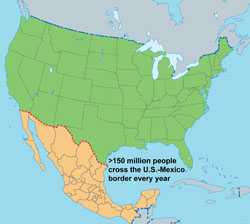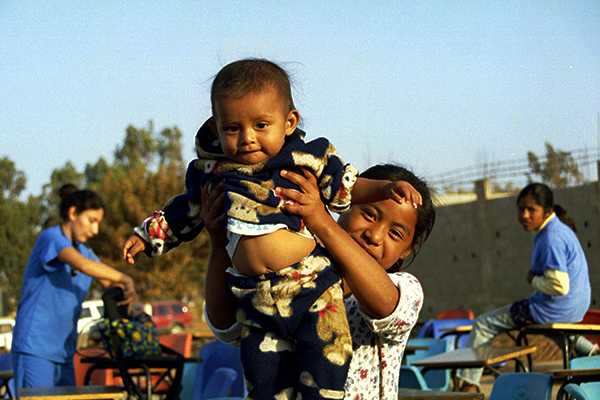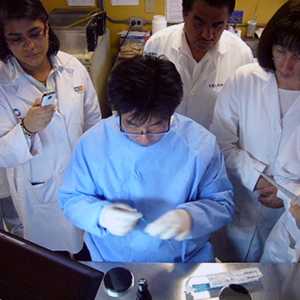United States - Mexico Unit
The United States and Mexico share almost 2,000 miles of border. The two countries are connected by a high volume of travelers, and many people go back and forth to live, work, and visit. Each year, more than 150 million people cross the land border between the United States and Mexico. In addition, shipments and food products cross the border daily. This movement of people and cargo plays a central role in the health of communities in both countries.

View from pedestrian walkway of cars crossing the United States-Mexico land border.
Collaborating on U.S.-Mexico Public Health
The United States and Mexico work closely to address binational health issues affecting the border region and mobile populations. CDC’s U.S.-Mexico Unit (USMU) serves as CDC’s official liaison with the Mexico Secretariat of Health and enhances collaboration between the two countries.
USMU is concerned with binational public health issues such as:
- Infectious disease outbreaks affecting both countries, including outbreaks among people who have traveled between the United States and Mexico;
- Diseases associated with product importation and distribution within North America; and
- The prompt identification and referral of travelers with infectious disease conditions, such as tuberculosis, who travel between the two countries.

Jurisdictions
USMU manages CDC Quarantine Stations in El Paso, Texas, and San Diego, California. The USMU quarantine jurisdiction includes all sea, air, and land ports of entry in Arizona, New Mexico, San Diego County and Imperial County in Southern California, and south and west Texas.
Responding to Illness
With the help of binational state and local health officials and federal agencies in the United States, USMU detects, notifies, and investigates reports of communicable disease cases at land border crossings, international airports and seaports, and on maritime vessels (cruise and cargo).
USMU reviews entry medical exams of legal immigrants who will reside permanently in the United States and notifies state and local health departments of any immigrants with public health conditions that need prompt evaluation or treatment.
USMU partners with other U.S. federal agencies and state and local health departments in preparedness activities related to quarantine and isolation at U.S. ports of entry.
For example, travelers attempting to enter the United States from Mexico with active tuberculosis must be medically evaluated, isolated if contagious, tested for drug resistance, and given a treatment plan.

Smiling girl and baby enjoying a health outreach event in the Mexican border state of Baja California. Photo courtesy Maureen Fonseca-Ford.
Binational Communication and Partnership
USMU facilitates communication with Mexico’s Secretariat of Health and with state and local public health officials about disease events involving both countries, such as new strains of influenza. Sharing information about potential risks in a timely manner, and facilitating an appropriate response, is important to protect the health of the public.
Disease Surveillance
USMU manages and supports the Border Binational Infectious Disease Surveillance (BIDS) program to improve disease prevention in the border region. BIDS provides technical assistance and subject-matter expertise to federal and state agencies in the United States and Mexico on binational infectious disease issues. The BIDS network has helped with early warning and identification of H1N1 influenza, dengue, rickettsia, measles, hepatitis A, rubella, and foodborne outbreaks.

Campylobacter training with binational laboratory experts.
Laboratory Expertise
USMU organizes CDC-customized trainings to strengthen laboratory diagnostic capability in the border region and Mexico. They also help facilitate the exportation and importation of biological specimens and laboratory testing reagents between the United States and Mexico. This improves routine surveillance of diseases like influenza and expedites identification of a pathogen causing an outbreak, allowing for more timely implementation of public health control measures. When outbreak investigations occur in Mexico, USMU provides technical guidance and assistance with laboratory testing and analyses.
Migrant Health
USMU works to improve the health of migrants by studying health status, access to care, vaccine status, and health disparities. The Unit also provides outreach and health education to migrant populations. USMU is dedicated to providing culturally and linguistically appropriate health information and materials for binational populations.
- Page last reviewed: December 23, 2016
- Page last updated: December 23, 2016
- Content source:


 ShareCompartir
ShareCompartir